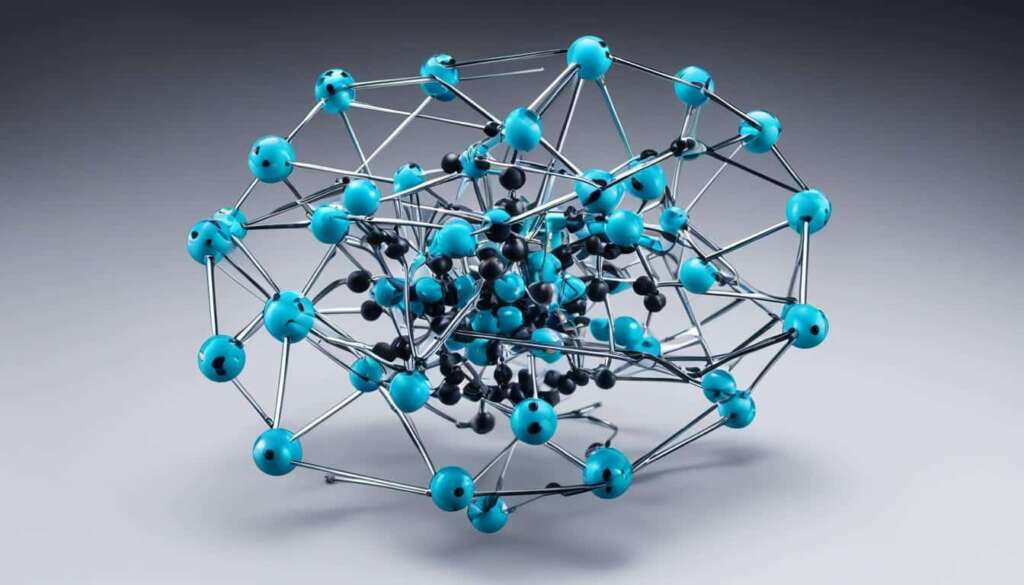Table of Contents
Nanotechnology is a rapidly growing field that is revolutionising various industries. Leading nanotechnology companies are at the forefront of innovation, developing cutting-edge technologies and solutions. These companies are creating new materials, devices, and applications that have the potential to transform industries such as healthcare, electronics, energy, and more. With their focus on nanoscale manipulation and unique properties of nanomaterials, these companies are driving advancements and pushing the boundaries of what is possible in the world of technology.
Key Takeaways
- Nanotechnology is a rapidly growing field.
- Leading nanotechnology companies are driving innovation.
- Nanomaterials and devices have the potential to transform industries.
- Nanotechnology is revolutionising healthcare, electronics, energy, and more.
- The impact of nanotechnology on various sectors is significant.
The Scope of Nanotechnology Industry
The nanotechnology industry is experiencing significant growth and has a wide range of applications. According to research reports, the global nanotechnology market is projected to reach billions of dollars in value by 2030 with a high compound annual growth rate (CAGR). This growth can be attributed to the advancements in nanoscale materials and the increasing adoption of nanotechnology in various industries.
Nanotechnology finds applications in fields such as electronics, healthcare, energy, agriculture, and more. It plays a crucial role in developing new materials, improving manufacturing processes, and enhancing product performance.
The potential of nanotechnology is vast, and leading companies in the industry are at the forefront of driving this growth.
One of the key drivers of the nanotechnology market is its applications in various industries. Let’s take a closer look at the applications of nanotechnology in some key sectors:
Nanotechnology in Electronics
Nanotechnology has revolutionized the electronics industry by enabling the development of smaller, faster, and more efficient electronic components. Nanoscale materials such as graphene and quantum dots have applications in transistors, displays, sensors, and batteries. These nanomaterials enhance device performance and pave the way for advancements in wearable technology, flexible electronics, and energy storage.
Nanotechnology in Healthcare
Nanotechnology has ushered in new possibilities in healthcare with applications in drug delivery, diagnostics, imaging, and regenerative medicine. Nanoparticles and nanodevices can target specific cells for precise and effective treatments. Leading nanotechnology companies in the healthcare sector are developing innovative solutions for cancer treatment, infectious diseases, and gene therapy.
Nanotechnology in Energy
Nanotechnology plays a vital role in the energy sector by improving energy efficiency and developing renewable energy solutions. Nanomaterials are used in solar panels, fuel cells, batteries, and energy storage devices to enhance performance and enable the efficient utilization of resources. Nanotechnology innovations are driving the development of sustainable and clean energy solutions.
Nanotechnology in Manufacturing and Materials Science
Nanotechnology is transforming the manufacturing and materials science fields. Nanomaterials with unique properties, such as exceptional strength and thermal conductivity, are being developed for advanced manufacturing applications. Leading nanotechnology companies are driving innovations in materials science, revolutionizing manufacturing processes, and enabling the development of lightweight, high-strength materials for various industries.
Nanotechnology in Agriculture and Environmental Applications
Nanotechnology has applications in agriculture and environmental management, contributing to more sustainable practices. Nanotechnology-based solutions enhance crop yields, improve soil health, and enable efficient water and waste management. Companies in the agricultural nanotechnology sector develop innovative products for targeted delivery of fertilizers and pesticides, reducing environmental impact and promoting sustainable agriculture.
The applications of nanotechnology are vast and diverse, spanning across industries and driving innovation and growth. The leading nanotechnology companies are playing a pivotal role in shaping the future of technology and pushing the boundaries of what is possible in nanotechnology.
Nanotechnology Companies in the Semiconductor Industry
Nanotechnology has revolutionized the semiconductor industry, enabling companies to create advanced components like transistors and chips using nanoscale materials and devices. This breakthrough technology has unlocked a new realm of possibilities, offering improved performance, higher efficiency, and miniaturization capabilities.
Leading the way in this field are companies such as International Business Machines Corporation (IBM), Intel Corporation, and Taiwan Semiconductor Manufacturing Company Limited (TSM). These semiconductor nanotechnology companies are driving innovations in chip fabrication, memory solutions, and nanoscale materials for the industry.
One of the key applications of nanotechnology in the semiconductor industry is chip manufacturing. The ability to manipulate materials at the nanoscale allows for the production of smaller, faster, and more powerful chips. These advancements have fueled the development of advanced electronic devices with increased computing power and functionality.
Nanotechnology also plays a crucial role in the development of memory solutions. By utilizing nanoscale materials, companies are able to enhance the performance and capacity of memory devices, enabling faster data storage and retrieval.
The following table highlights some of the leading nanotechnology companies in the semiconductor industry:
| Company | Description |
|---|---|
| International Business Machines Corporation (IBM) | IBM is a global technology company known for its innovative solutions in various industries. In the semiconductor industry, IBM is at the forefront of developing nanoscale materials and devices for chip manufacturing. |
| Intel Corporation | Intel is a leading semiconductor company that has heavily invested in nanotechnology research and development. The company utilizes nanoscale materials in the fabrication of advanced chips. |
| Taiwan Semiconductor Manufacturing Company Limited (TSM) | TSM is one of the largest semiconductor manufacturers in the world. The company leverages nanoscale materials and processes to produce cutting-edge chips for various applications. |
These companies, along with many others in the semiconductor industry, are driving forward the use of nanotechnology to create innovative and efficient semiconductor components. Their advancements in chip manufacturing and memory solutions are shaping the future of the industry, pushing the boundaries of what is possible in electronic devices.
![]()
With nanotechnology continuing to evolve, we can expect further breakthroughs in the semiconductor industry, leading to even smaller, more powerful, and energy-efficient electronic devices.
Nanotechnology in Healthcare
Nanotechnology has the potential to revolutionize healthcare, leading to significant advancements in the field of nanomedicine. Through the use of nanoparticles and nanodevices, nanotechnology enables targeted drug delivery, imaging, diagnostics, and regenerative medicine. These nanoscale materials can be engineered to specifically target diseased cells, allowing for more precise and effective treatment.
Leading nanotechnology companies in the healthcare sector are at the forefront of developing innovative solutions for various medical applications. They are focused on improving cancer treatments, tackling infectious diseases, advancing gene therapy, and much more. With nanotechnology, these companies are paving the way for breakthroughs that have the potential to greatly improve patient outcomes and transform the way healthcare is delivered.
Nanotechnology in Drug Delivery
One of the key areas where nanotechnology has had a significant impact is in drug delivery. Nanoparticles can be designed to encapsulate drugs, protecting them from degradation and improving their delivery to specific target sites in the body. By precisely controlling the size, shape, and surface properties of these nanoparticles, drug release can be tailored to achieve optimal therapeutic effects.
Furthermore, nanotechnology allows for targeted drug delivery to specific cells or tissues, minimizing side effects and maximizing the therapeutic efficacy of drugs. Nanocarriers can be functionalized to specifically recognize and bind to diseased cells, delivering drugs directly to the affected areas. This targeted approach enhances the accessibility of drugs to diseased cells, increasing their effectiveness while reducing their impact on healthy tissues.
The use of nanotechnology in drug delivery has the potential to revolutionize medical treatments, enabling more precise and personalized therapies for patients.
Moreover, the unique properties of nanomaterials, such as their high surface area and reactivity, allow for the development of innovative drug delivery systems. For example, nanotechnology enables the sustained release of drugs over an extended period, reducing the need for frequent dosing and improving patient compliance. These advancements in nanomedicine have the potential to address challenges in drug formulation and enhance the efficacy and safety of various treatments.
Nanotechnology in Diagnostics
In addition to drug delivery, nanotechnology plays a vital role in diagnostics, enabling the development of highly sensitive and accurate diagnostic tools. Nanoparticles can be functionalized with specific molecules, such as antibodies or DNA probes, to detect and bind to target molecules associated with diseases. This interaction can generate detectable signals, allowing for the identification and quantification of disease markers.
One example is the use of nanoparticles in imaging techniques, such as magnetic resonance imaging (MRI) and computed tomography (CT). Nanoparticles can be engineered to have unique magnetic or optical properties, enhancing the contrast and sensitivity of imaging modalities. This enables healthcare professionals to visualize and accurately diagnose diseases at an early stage.
Nanotechnology is also advancing the field of point-of-care testing, enabling rapid and portable diagnostic devices for on-site disease detection. Nanosensors can be integrated into handheld devices or wearable technologies, allowing for real-time monitoring of biomarkers and providing immediate results for diseases such as diabetes, cardiovascular conditions, and infectious diseases.
Nanotechnology in Regenerative Medicine
Furthermore, nanotechnology holds promise in the field of regenerative medicine, offering the potential to repair and regenerate damaged tissues and organs. Nanomaterials can be used as scaffolds, providing a three-dimensional structure that supports cell growth, migration, and differentiation. These scaffolds, made from biocompatible and biodegradable materials, can mimic the natural environment of cells and facilitate tissue regeneration processes.
In addition to scaffolds, nanotechnology can also be utilized to deliver growth factors, proteins, or stem cells to enhance tissue regeneration. Nanoparticles can be employed to encapsulate and protect these bioactive molecules, allowing for controlled release and ensuring their effectiveness at the desired sites.
Nanomedicine Innovations in Cancer Treatment
Cancer treatment is one area where nanotechnology has shown immense promise. Nanoparticles can be designed to selectively deliver anticancer drugs to tumor cells, minimizing damage to healthy tissues and reducing side effects. This targeted drug delivery approach improves the effectiveness of chemotherapy and reduces the associated toxicity.
The use of nanotechnology in cancer treatment has the potential to enhance the efficacy and safety of therapies, providing new hope for patients.
Nanoparticles can also be functionalized with specific targeting ligands that recognize and bind to cancer cells’ receptors. This active targeting strategy allows for improved drug delivery and enhanced accumulation of therapeutic agents in tumor tissues. Additionally, nanotechnology-based imaging techniques enable the early detection of tumors and the monitoring of treatment responses, contributing to personalized cancer care.
Advances in Nanotechnology for Healthcare Applications
| Nanomedicine Application | Advances in Nanotechnology |
|---|---|
| Targeted Drug Delivery | Nanoparticle-based drug carriers for specific cell targeting and controlled release mechanisms |
| Diagnostic Imaging | Nanoparticles with enhanced contrast agents for improved imaging modalities |
| Regenerative Medicine | Nanoscale scaffolds and delivery systems for tissue engineering and regeneration |
| Cancer Treatment | Targeted drug delivery systems and imaging techniques for more effective and personalized therapies |
As nanotechnology continues to advance, the possibilities for its application in healthcare are vast. Nanomedicine offers solutions for targeted drug delivery, precise diagnostics, and regenerative medicine, among others. The innovative technologies being developed by leading nanotechnology companies in the healthcare sector hold immense potential to transform the field, greatly improving patient outcomes and revolutionizing healthcare as we know it.
Nanotechnology in Electronics
Nanotechnology is playing a critical role in revolutionizing the electronics industry. By harnessing the potential of nanoscale materials and devices, companies are creating electronic components that are smaller, faster, and more efficient than ever before.
The development of nanomaterials with unique properties, such as graphene and quantum dots, has opened up exciting possibilities in electronics. These nanomaterials are being used in a wide range of applications, from transistors and displays to sensors and batteries.
The use of nanotechnology in electronics is driving advancements in various areas. From wearable technology that seamlessly integrates into our daily lives, to flexible electronics that can be bent or stretched, nanotechnology is pushing the boundaries of what’s possible in electronic devices.
Companies at the forefront of nanotechnology in the electronics industry are revolutionizing devices and paving the way for future innovations. Through their research and development efforts, they are pushing the limits of nanoelectronics and exploring new frontiers in energy storage and efficiency.
“Nanomaterials and nanodevices are enabling the creation of electronic components that are not only smaller but also more powerful and energy-efficient. This opens up opportunities for developing advanced technologies and improving the performance of consumer electronics, medical devices, and beyond.” – Dr. Sarah Johnson, Nanotechnology Expert
Applications of Nanotechnology in Electronics
The applications of nanotechnology in electronics are vast and varied. Here are some key areas where nanotechnology is making a difference:
- Semiconductors: Nanotechnology is enabling the creation of nanoscale components, such as transistors, that offer improved performance and higher efficiency.
- Displays: Nanomaterials are being used in the construction of high-resolution and energy-efficient displays, such as OLED and quantum dot displays.
- Sensors: Nanotechnology is improving the sensitivity and accuracy of sensors used in various applications, such as environmental monitoring and medical diagnostics.
- Batteries: Nanomaterials are being used to enhance the energy storage capacity and charging efficiency of batteries, leading to longer-lasting and faster-charging devices.
These are just a few examples of how nanotechnology is shaping the future of electronics. With ongoing research and development, we can expect to see even more exciting advancements in the field of nanoelectronics.
Nanotechnology in Energy
Nanotechnology is paving the way for significant advancements in the energy sector. Companies are harnessing the power of nanoscale materials and devices to improve energy efficiency, develop renewable energy solutions, and enhance energy storage systems. By leveraging nanomaterials in solar panels, fuel cells, batteries, and other energy storage devices, companies can enhance their performance and optimize the utilization of energy resources.
Renewable energy nanotechnology companies are at the forefront of driving innovation in the pursuit of more sustainable and clean energy solutions. Nanotechnology innovations are enabling the development of cutting-edge technologies that address the challenges facing the energy industry.
One particularly exciting application of nanotechnology in the energy sector is in solar energy. By incorporating nanomaterials into solar panels, researchers and companies have been able to enhance their efficiency and make them more cost-effective. Semiconductor nanocrystals, such as quantum dots, have demonstrated great potential in enabling more efficient light absorption and energy conversion in photovoltaic cells.
Nanotechnology is also revolutionizing energy storage systems. Companies are developing nanomaterials for batteries and supercapacitors that offer higher energy density, longer lifespan, and faster charging capabilities. These advancements in energy storage technology are crucial for the development of reliable and efficient renewable energy systems.
Furthermore, nanotechnology is facilitating the exploration of alternative energy sources. Nanomaterials are being used in the development of advanced catalysts for fuel cells, enabling efficient conversion of chemical energy into electricity. This has the potential to revolutionize the transportation sector by providing cleaner and more sustainable power sources for vehicles.
Overall, nanotechnology is driving significant progress in the energy sector, with nanomaterials playing a pivotal role in improving energy efficiency, developing renewable energy solutions, and enhancing energy storage systems. By leveraging nanotechnology, renewable energy nanotechnology companies are leading the charge towards a more sustainable and cleaner future.

| Nanomaterial | Energy Application |
|---|---|
| Graphene | Solar cells, batteries, supercapacitors |
| Quantum Dots | Solar cells, LEDs, photodetectors |
| Nanotubes | Fuel cells, batteries, energy storage |
| Nanoporous Materials | Energy-efficient membranes, capacitive energy storage |
Nanotechnology in Manufacturing and Materials Science
Nanotechnology is revolutionizing the field of manufacturing and materials science, enabling the development of advanced materials with unique properties. These nanomaterials, with their exceptional strength, durability, and thermal conductivity, are being used across various industries to enhance product performance and drive innovation.
Companies specializing in nanotechnology in manufacturing are at the forefront of developing new materials and processes that not only increase efficiency but also reduce environmental impact. By harnessing the power of nanotechnology, these companies are creating lightweight, high-strength materials that are transforming sectors such as aerospace, automotive, and more.
One of the key advantages of nanomaterials in manufacturing is their ability to optimize product performance. By manipulating materials at the nanoscale, manufacturers can enhance properties such as mechanical strength, electrical conductivity, and heat resistance. This opens up possibilities for creating products that are stronger, more durable, and better suited for demanding applications.
“Nanotechnology is driving remarkable advancements in manufacturing and materials science,” says Dr. Emily Wilson, a leading expert in nanotechnology. “With the ability to engineer materials at the atomic and molecular level, we can create substances with unparalleled properties and transform the way we produce goods.”
Moreover, nanotechnology in manufacturing offers environmental benefits. By incorporating nanomaterials into production processes, companies can reduce waste, lower energy consumption, and minimize the use of harmful chemicals. This contributes to a more sustainable and eco-friendly approach to manufacturing.
A key area of focus in nanotechnology is materials science. The study of nanomaterials and their unique characteristics has led to the discovery of new materials with unprecedented properties. From graphene to carbon nanotubes, these materials are reshaping the manufacturing landscape.
Companies in the nanotechnology sector are continually pushing the boundaries of materials science, exploring the potential of nanomaterials in various applications. For example, nanomaterials are being used to develop self-cleaning surfaces, antimicrobial coatings, and high-performance composites.
The Future of Nanotechnology in Manufacturing
The future of nanotechnology in manufacturing is promising. As research and development continue to advance, we can expect to see further breakthroughs in materials science and production processes. Nanotechnology holds the potential to revolutionize manufacturing, enabling the creation of innovative products with enhanced performance and sustainability.
Nanotechnology in Agriculture and Environmental Applications
Nanotechnology is revolutionizing various industries, and agriculture and environmental applications are no exception. The use of nanoscale materials and devices has the potential to greatly enhance agricultural practices, improve crop yields, and promote sustainable farming methods. Additionally, nanotechnology offers innovative solutions for efficient water and waste management, contributing to a cleaner and healthier environment.
Nanotechnology in Agriculture
In agriculture, nanotechnology is being employed to address challenges related to crop production, soil health, and pest control. Companies in the agricultural nanotechnology sector are developing advanced products that optimize nutrient delivery, increase efficiency in crop protection, and improve plant growth. By precisely targeting the delivery of fertilizers, pesticides, and plant growth regulators, nanotechnology minimizes the environmental impact associated with conventional agricultural practices.

“The integration of nanotechnology in agriculture has the potential to revolutionize food production by enhancing crop yield, reducing chemical usage, and mitigating environmental impacts.”
Through nanotechnology, innovative solutions are being developed to combat pests, diseases, and nutrient deficiencies. For example, nanomaterials can be engineered to encapsulate and release nutrients gradually, maximizing their absorption by plants and minimizing nutrient runoff, which contributes to water pollution and eutrophication. Similarly, nanotechnology-based pesticides can target specific pests, minimizing their harm to beneficial insects and reducing the need for broad-spectrum chemicals.
Nanotechnology in Environmental Applications
Besides agriculture, nanotechnology is also being applied to address environmental challenges such as water purification, pollution control, and waste management. Nanoscale materials and devices are used to create innovative solutions that improve the efficiency and effectiveness of these processes.
Nanotechnology enables the development of advanced filtration systems that can remove contaminants from water, including heavy metals, pharmaceuticals, and bacteria. By utilizing nanomaterials with high surface area and unique properties, nanofilters can provide superior purification results compared to conventional methods.
In waste management, nanotechnology offers solutions for efficient and sustainable treatment and disposal. Nanomaterials can be utilized to remove toxic substances from waste streams, enhance the degradation of organic matter, and develop efficient methods for recycling and recovery of valuable materials.
“Nanotechnology has the potential to revolutionize environmental applications, making water purification, pollution control, and waste management more efficient and sustainable.”
Leading Agricultural Nanotechnology Companies
Several companies are at the forefront of agricultural nanotechnology, developing innovative products and technologies to address the challenges faced by the agriculture industry.
| Company | Country |
|---|---|
| AgriMetis | United States |
| Phytelligence | United States |
| AgBioChem | United Kingdom |
| NanoAgri | India |
| NanoMech | United States |
These agricultural nanotechnology companies are dedicated to developing solutions that promote sustainable farming practices, reduce resource consumption, and minimize the environmental impact of agriculture.
With ongoing research and development, nanotechnology continues to unlock the potential for transformative advancements in agriculture and environmental applications. By harnessing the power of nanoscale materials and devices, we can create a more sustainable and environmentally friendly future.
Emerging Nanotechnology Startups
In addition to established nanotechnology companies, there are also numerous emerging nanotechnology startups that are driving innovations in various industries. These startups are focusing on developing breakthrough technologies, novel materials, and disruptive applications of nanotechnology. Their entrepreneurial spirit and innovative approaches are pushing the boundaries of what is possible in nanotechnology. These startups are attracting investment and attention from venture capitalists and industry leaders, as they have the potential to create transformative solutions and reshape industries.
These emerging nanotechnology startups are characterized by their agility and ability to adapt quickly to changing market demands. They are often founded by scientists, engineers, and entrepreneurs with a deep understanding of nanotechnology and its applications. These startups leverage their expertise to develop unique solutions that address industry challenges and create new opportunities.
One notable nanotechnology startup is Nanosys, which focuses on the development of nanomaterials for advanced electronic displays. Nanosys has created innovative quantum dot technology that enhances the color and efficiency of displays, leading to brighter, more vibrant screens. Their technology has been adopted by major electronics manufacturers and is paving the way for the next generation of displays.
“Nanosys is at the forefront of nanotechnology innovation in the electronics industry. Their quantum dot technology has the potential to revolutionize the display market and unlock new possibilities for consumer electronics.” – Industry Expert
Another emerging nanotechnology startup is Nanobiotix, a company that utilizes nanotechnology for cancer treatment. Nanobiotix has developed nanoparticles that can be selectively activated to destroy cancer cells when exposed to external stimuli such as radiotherapy. This targeted approach minimizes the damage to healthy cells and enhances the effectiveness of cancer treatment.
“Nanobiotix’s nanotechnology-based approach to cancer treatment has the potential to improve patient outcomes and transform the field of oncology. Their innovative solution offers a promising future for personalized and targeted therapies.” – Medical Professional
These examples highlight the potential of emerging nanotechnology startups to disrupt industries and introduce groundbreaking innovations. As these startups continue to grow and gain traction, they have the potential to revolutionize sectors such as healthcare, electronics, energy, and more.
Key Characteristics of Emerging Nanotechnology Startups:
- Focused on developing breakthrough technologies and novel materials
- Driven by an entrepreneurial spirit and innovative approaches
- Attracting investment and attention from venture capitalists and industry leaders
- Quick to adapt and respond to changing market demands
- Founded by experts in nanotechnology and its applications
These emerging nanotechnology startups are instrumental in driving the continued growth and advancement of nanotechnology. Their innovations have the potential to reshape industries and improve the quality of life for individuals around the world.
World’s Leading Companies in the Nanotechnology Industry
The nanotechnology industry is dominated by several world-leading companies. These companies have established themselves as pioneers and leaders in the field of nanotechnology. They have a strong presence in various sectors such as semiconductors, healthcare, electronics, manufacturing, and more. Some of the leading nanotechnology companies include Taiwan Semiconductor Manufacturing Company Ltd., Thermo Fisher Scientific Inc., DuPont de Nemours, Inc., Applied Materials, and CMC Materials. These companies have a track record of innovation, research, and development, and are driving advancements in nanotechnology.
When it comes to leading nanotechnology companies, Taiwan Semiconductor Manufacturing Company Ltd. (TSMC) stands out. Founded in 1987, TSMC has become the world’s largest dedicated semiconductor foundry, operating cutting-edge facilities for the fabrication of advanced semiconductor components. With its commitment to research and development, TSMC has been at the forefront of semiconductor nanotechnology, enabling the production of smaller, faster, and more powerful chips for various applications.
Another industry leader in the nanotechnology field is Thermo Fisher Scientific Inc. Thermo Fisher Scientific is a global leader in scientific research and provides a wide range of products and services, including nanotechnology-enabled instruments and solutions. Their nanotechnology offerings contribute to advancements in research, diagnostics, and drug discovery, empowering scientists to explore the nanoscale and unlock new possibilities in various scientific disciplines.
DuPont de Nemours, Inc., commonly known as DuPont, is a multinational conglomerate with a rich history in innovation. DuPont has been actively involved in nanotechnology research and development, leveraging its expertise to create nanoscale materials and applications that address various industry challenges. From nanomaterials for electronics to advanced coatings and materials for energy storage, DuPont is shaping the future of nanotechnology.
Applied Materials is another prominent player in the nanotechnology industry. As a leading provider of equipment, services, and software for the semiconductor and display industries, Applied Materials plays a crucial role in advancing nanotechnology in the electronics sector. Its nanoscale manufacturing solutions enable the production of increasingly complex and high-performance electronic devices, bolstering the growth and innovation in the industry.
CMC Materials, formerly known as Cabot Microelectronics Corporation, specializes in materials for semiconductor manufacturing and polishing applications. The company’s nanotechnology-enabled solutions are essential in achieving precision and quality in semiconductor fabrication processes. Through continuous research and development, CMC Materials aims to provide cutting-edge materials that drive advancements in nanotechnology and improve semiconductor performance.
In summary, the nanotechnology industry is propelled forward by the world’s leading companies. These companies, such as TSMC, Thermo Fisher Scientific, DuPont, Applied Materials, and CMC Materials, have established themselves as pioneers in the field, driving innovations and advancing the boundaries of nanotechnology. Through their research, development, and application of nanoscale materials and devices, these companies are shaping the future of technology across various sectors.
“The true beauty of nanotechnology lies in the transformative potential it offers. These leading companies are harnessing the power of nanotechnology to create solutions that revolutionize industries and improve lives.” – Nanotech Innovator
| Company | Industry |
|---|---|
| Taiwan Semiconductor Manufacturing Company Ltd. (TSMC) | Semiconductors |
| Thermo Fisher Scientific Inc. | Scientific Research |
| DuPont de Nemours, Inc. | Materials Science |
| Applied Materials | Electronics |
| CMC Materials | Semiconductor Manufacturing |
These leading nanotechnology companies are driving advancements and pushing the boundaries of what is possible in the nanotechnology industry. Their commitment to research, innovation, and development positions them as industry leaders, paving the way for a future shaped by nanotechnology.
Conclusion
Nanotechnology companies are revolutionizing various industries through their innovative advancements and endless possibilities. With a vast scope and diverse applications, nanotechnology is driving progress in healthcare, electronics, agriculture, energy, and many other fields. Through continued research and development, nanotechnology has the potential to reshape industries, improve quality of life, and contribute to a sustainable future.
Leading nanotechnology companies are at the forefront of this technological revolution, pushing the boundaries of what is possible. They are creating cutting-edge solutions by harnessing the unique properties of nanoscale materials, devices, and applications. By pushing the limits of nanoscale manipulation, these companies are driving innovation that will shape the future of technology.
As the nanotechnology industry continues to grow, these companies are playing a crucial role in shaping its future. Their advancements in nanomedicine, electronics, energy, manufacturing, agriculture, and more are paving the way for transformative solutions. With their focus on research, development, and collaboration, they are driving the progress of nanotechnology as a whole.
The future of nanotechnology is bright, with endless possibilities and potential. As nanotechnology companies continue to push the boundaries of innovation, we can expect to see further advancements and breakthroughs that will revolutionize industries and improve the lives of people worldwide. The leading nanotechnology companies are shaping a future where technology and nanoscale solutions play a pivotal role in addressing global challenges and creating a more sustainable world.
FAQ
What is nanotechnology?
Nanotechnology is a field of science and technology that focuses on manipulating and engineering materials at the nanoscale level. It involves working with materials and devices that have dimensions in the range of 1 to 100 nanometers.
How is nanotechnology being used in various industries?
Nanotechnology is being used in industries such as healthcare, electronics, energy, manufacturing, agriculture, and more. It is enabling the development of new materials, improving manufacturing processes, enhancing product performance, and revolutionizing various applications across different sectors.
What are the potential applications of nanotechnology in healthcare?
Nanotechnology has the potential to revolutionize healthcare by enabling targeted drug delivery, imaging, diagnostics, and regenerative medicine. Nanoscale materials and devices can be engineered to specifically target diseased cells, resulting in more effective and precise treatment options.
How is nanotechnology influencing the electronics industry?
Nanotechnology is playing a critical role in the electronics industry by enabling the creation of smaller, faster, and more efficient electronic components. Nanoscale materials such as graphene and quantum dots are being used in transistors, displays, sensors, batteries, and other electronic devices to enhance their performance.
How is nanotechnology contributing to the energy sector?
Nanotechnology is contributing to the energy sector by improving energy efficiency, developing renewable energy solutions, and enhancing energy storage systems. Nanoscale materials and devices are being used in solar panels, fuel cells, batteries, and energy storage devices to increase their performance and utilization of energy resources.
How is nanotechnology revolutionizing manufacturing and materials science?
Nanotechnology is revolutionizing manufacturing and materials science by enabling the development of advanced and high-performance materials. Nanomaterials with unique properties such as exceptional strength, durability, and thermal conductivity are being used in industries such as aerospace, automotive, and more, to enhance product performance, increase efficiency, and reduce environmental impact.
What are the potential applications of nanotechnology in agriculture and environmental applications?
Nanotechnology has the potential to improve crop yields, enhance soil health, and enable efficient water and waste management in agriculture. It is being used for targeted delivery of fertilizers, pesticides, and plant growth regulators, reducing the environmental impact of traditional agricultural practices.
What are some emerging nanotechnology startups?
There are numerous emerging nanotechnology startups that are driving innovations in various industries. These startups are focusing on developing breakthrough technologies, novel materials, and disruptive applications of nanotechnology. They have the potential to create transformative solutions and reshape industries.
Who are the leading companies in the nanotechnology industry?
Some of the leading nanotechnology companies include Taiwan Semiconductor Manufacturing Company Ltd., Thermo Fisher Scientific Inc., DuPont de Nemours, Inc., Applied Materials, and CMC Materials. These companies have a track record of innovation, research, and development, and are driving advancements in nanotechnology.
How is nanotechnology driving innovation and shaping the future?
Nanotechnology companies are at the forefront of technological advancements, driving innovation and pushing the boundaries of what is possible in various industries. With continued research and development, nanotechnology has the potential to revolutionize industries, improve quality of life, and contribute to a more sustainable future.













